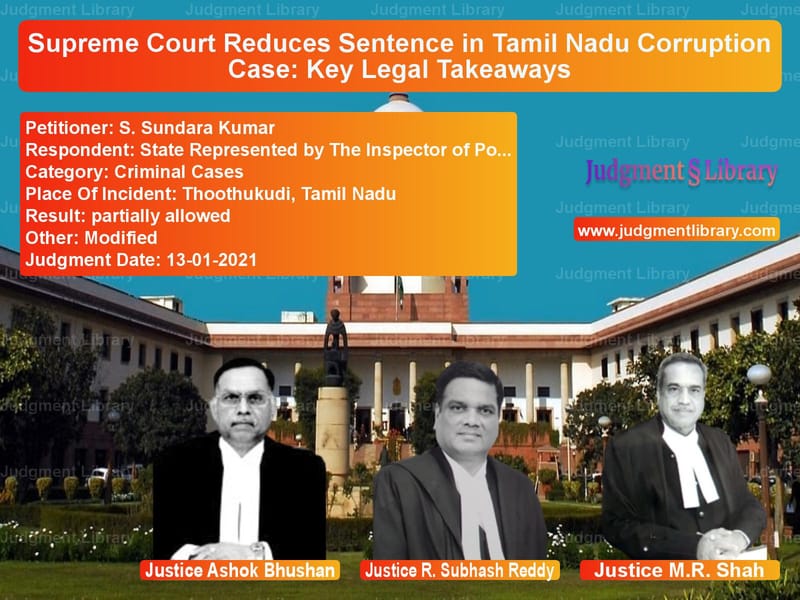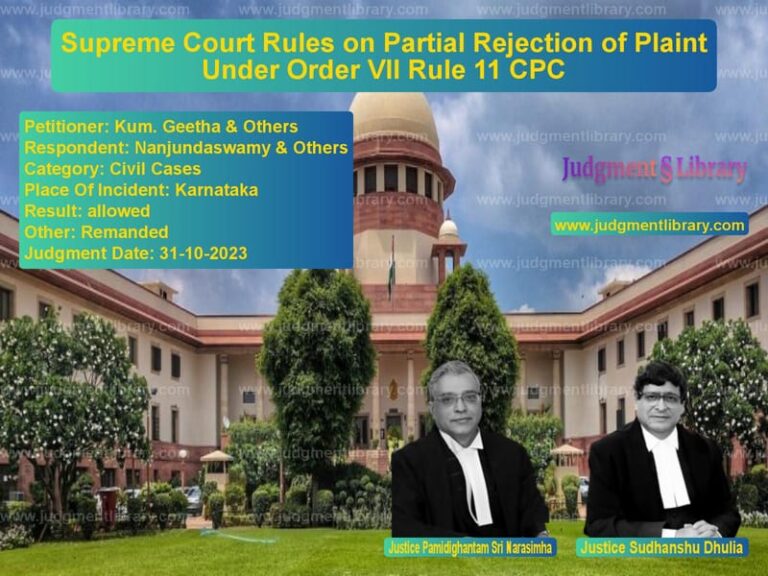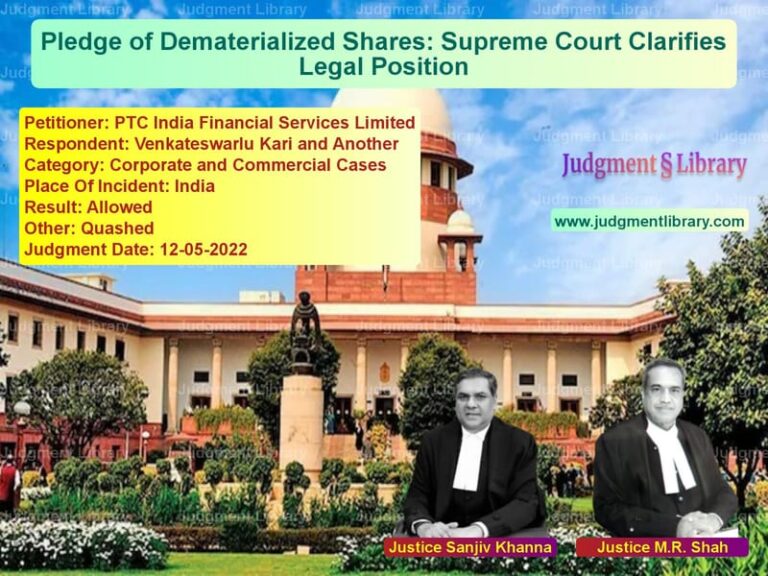Supreme Court Reduces Sentence in Tamil Nadu Corruption Case: Key Legal Takeaways
The Supreme Court of India, in the case of S. Sundara Kumar vs. State Represented by The Inspector of Police, Vigilance and Anti-Corruption, Thoothukudi District, addressed an important issue concerning sentencing in corruption cases. The judgment, while upholding the conviction under the Prevention of Corruption Act, 1988, reduced the sentence based on mitigating factors, including the age of the accused and time already served. This ruling highlights the balance courts must maintain between deterrence and proportionality in criminal sentencing.
Background of the Case
The case arose from allegations of corruption against the appellant, S. Sundara Kumar, who was a public servant in Tamil Nadu. The prosecution charged him under Sections 7 and 13(2) read with Section 13(1)(d) of the Prevention of Corruption Act, 1988, for accepting a bribe. Following a trial, the court convicted him and sentenced him to two years of rigorous imprisonment along with a fine of Rs. 5,000.
The conviction was upheld by the High Court of Madras. However, the appellant approached the Supreme Court seeking a reduction in sentence, citing his age, medical condition, and the fact that he had already served a significant portion of his term.
Legal Issues Raised
- Whether the conviction was legally sustainable under the Prevention of Corruption Act, 1988.
- Whether the sentence of two years rigorous imprisonment was excessive given the mitigating circumstances.
- Whether the Supreme Court had the discretion to reduce the sentence while upholding the conviction.
Petitioner’s (S. Sundara Kumar) Arguments
- The appellant had already served over one year and one month of the two-year sentence.
- He was a senior citizen, aged 69-70 years, suffering from multiple health conditions.
- His dismissal from service had already caused severe financial and social hardship.
- The punishment imposed by the trial court was excessive and should be reduced.
Respondent’s (State of Tamil Nadu) Arguments
- The prosecution provided sufficient evidence proving the accused accepted a bribe.
- The Prevention of Corruption Act is intended to deter public servants from engaging in corrupt practices.
- Reducing the sentence would set a wrong precedent, potentially undermining the fight against corruption.
- The trial court and the High Court had correctly imposed the punishment, considering the seriousness of the offense.
Supreme Court’s Observations
The Supreme Court examined the nature of the offense and the mitigating circumstances surrounding the appellant’s case. The Court made the following key observations:
- The appellant had served more than one year and one month of the two-year sentence.
- Given the appellant’s age and medical condition, reducing the sentence would serve the ends of justice.
- While deterrence is an important consideration, punishment should not be unduly harsh, especially in cases where the convict has already suffered professional and financial consequences.
- The fine imposed by the lower courts was reasonable and did not require modification.
“In the facts and circumstances of the case, the ends of justice would be met if the sentence of two years rigorous imprisonment is reduced to one year and one-month rigorous imprisonment.”
The Supreme Court further emphasized that courts have the discretion to modify sentences while maintaining the principle of deterrence in corruption cases. The ruling clarified that mitigating factors such as advanced age, health conditions, and time already served can be considered when determining the appropriate sentence.
Final Judgment
- The Supreme Court upheld the conviction of S. Sundara Kumar under the Prevention of Corruption Act, 1988.
- The sentence was reduced from two years of rigorous imprisonment to one year and one month.
- The fine of Rs. 5,000 imposed by the lower courts remained unchanged.
- The appellant was ordered to be released upon completion of the reduced sentence.
Implications of the Judgment
This ruling has significant implications for the sentencing of public servants in corruption cases:
- Judicial Discretion in Sentencing: The case demonstrates the Supreme Court’s authority to balance deterrence with proportionality in criminal sentencing.
- Consideration of Mitigating Factors: Courts may reduce sentences when the accused is elderly or has already suffered professional consequences.
- Prevention of Corruption Act Enforcement: While the conviction was upheld, the judgment reinforces the principle that each case should be decided based on its unique circumstances.
- Deterrence vs. Proportionality: The ruling ensures that while corruption is punished, the punishment remains fair and just.
Conclusion
The Supreme Court’s ruling in S. Sundara Kumar vs. State Represented by The Inspector of Police is an important precedent in corruption cases. It upholds the principle that public servants guilty of corruption must be punished but also recognizes the need for proportionality in sentencing. The judgment serves as a reminder that courts must carefully balance deterrence, justice, and individual circumstances when deciding criminal appeals.
Petitioner Name: S. Sundara Kumar.Respondent Name: State Represented by The Inspector of Police, Vigilance and Anti-Corruption, Thoothukudi District.Judgment By: Justice Ashok Bhushan, Justice R. Subhash Reddy, Justice M.R. Shah.Place Of Incident: Thoothukudi, Tamil Nadu.Judgment Date: 13-01-2021.
Don’t miss out on the full details! Download the complete judgment in PDF format below and gain valuable insights instantly!
Download Judgment: s.-sundara-kumar-vs-state-represented-by-supreme-court-of-india-judgment-dated-13-01-2021.pdf
Directly Download Judgment: Directly download this Judgment
See all petitions in Fraud and Forgery
See all petitions in Extortion and Blackmail
See all petitions in Money Laundering Cases
See all petitions in Judgment by Ashok Bhushan
See all petitions in Judgment by R. Subhash Reddy
See all petitions in Judgment by Mukeshkumar Rasikbhai Shah
See all petitions in partially allowed
See all petitions in Modified
See all petitions in supreme court of India judgments January 2021
See all petitions in 2021 judgments
See all posts in Criminal Cases Category
See all allowed petitions in Criminal Cases Category
See all Dismissed petitions in Criminal Cases Category
See all partially allowed petitions in Criminal Cases Category







